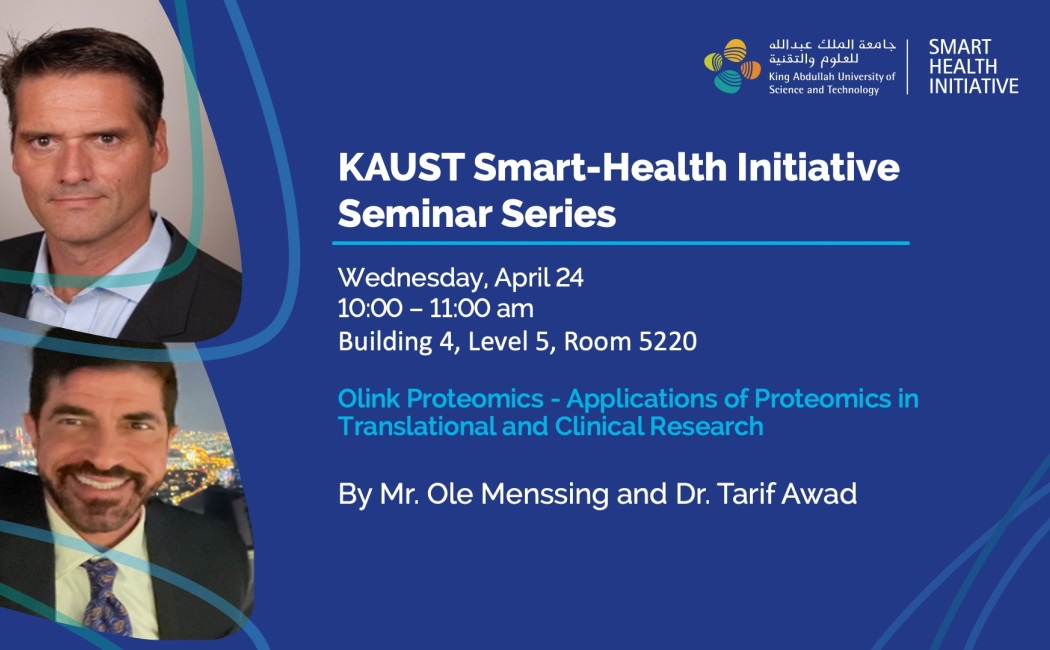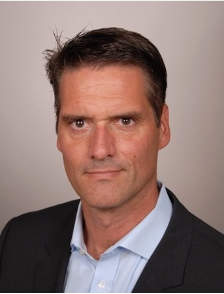
KSHI Seminar: Olink Proteomics - Applications of Proteomics in Translational and Clinical Research
Host
Prof. Imed Gallouzi, Professor, Biological and Environmental Science and Engineering (BESE) Division; Associate Director, COO, KAUST Smart-Health Initiative
Abstract
The proteomics revolution is advancing biomedical research beyond the genomics era, delivering unparalleled insights into human biology, disease mechanisms, while empowering the development of novel therapeutics. This is demonstrated with the emergence of proteogenomics, a powerful paradigm integrating large proteomics datasets with genomics and clinical data, yielding invaluable knowledge and insights in disease biology and drug mechanism of action. Olink is empowering this revolution with sensitive, highly multiplexed proteomics assays designed to reveal real-time changes in proteins and pathways, thereby bridging the gaps between genetic predisposition, environmental variability, and disease phenotypes. This data-rich approach is transforming disease and pharmaceutical research across many therapeutic areas, including cancer, cardiometabolic, neurological, inflammatory, and infectious diseases. Moreover, ongoing proteomics research on the biology of aging and age-related illnesses is enhancing our understanding of the aging process and facilitating the discovery of predictive biomarkers for healthy longevity and the progression of chronic diseases. Translation of proteomic signatures from research into clinical practice is another trend promising significant impact on precision and personalized medicine, with neurological disorders at the forefront.
This presentation takes a scientific journey through how Olink's proteomics technology is helping investigators make significant advances in biomedical research and clinical development, drawing on examples from published studies in population health and translational research across a range of therapeutic areas.
About Olink Proteomics
Olink Proteomics is a Swedish company offering advanced tools for protein biomarker discovery and translation, with a focus on innovation, quality, and transparency. Our mission is to accelerate proteomics together with the scientific community, unravel the complexity of real-time biology, and gain actionable insights into human health and disease. Olink’s technology platform is based on the Proximity Extension Assay (PEA), which enables proteomics measurements with exceptional sensitivity and precision, and can be applied over a range of multiplexing levels and diverse sample types. The platform has been used to make significant discoveries in basic and clinical research, appearing in approximately 1,700 peer-reviewed publications to date. Olink’s scientific community is making impactful new discoveries across a range of human illnesses, driving the development of more effective diagnostic and therapeutic tools, and helping revolutionize future healthcare through the implementation of precision medicine.
Bios

Mr. Ole Menssing
Ole started at Olink Proteomics in July 2013 as Business Development Manager for the Middle East and Africa. He focuses on introducing the Olink solution in these regions. With previous stations at Millipore, Zeiss, Illumina and Nanostring, Ole brings broad knowledge and experience in technologies serving the Life Sciences markets. He successfully developed collaborations in the markets and applications of biomarker discovery and validation, cancer research, pharma development, and reproductive health. Ole lives in Berlin, Germany.

Dr. Tarif Awad
Tarif joined Olink Proteomics in 2022 and currently serves as the Head of Scientific Market Development, focused on extending the reach of high-performance proteomics tools into emerging regions globally. His work centers on driving strategic partnerships between regional and global investigators, aimed at using proteomics to unravel the molecular basis of disease, improve healthcare for local communities, and help researchers make significant contributions to scientific progress world-wide. Prior to entering the proteomics arena, Tarif spent many years with genomics tools providers, leading scientific support and managing a range of strategic collaborations in basic and clinical fields, including biomarker discovery, cancer research, pharma development, and reproductive health. He obtained his PhD from the University of Washington and postdoctoral training at the Fred Hutchinson Cancer Research Center, both in Seattle, Washington. Tarif lives in San Francisco, California.
